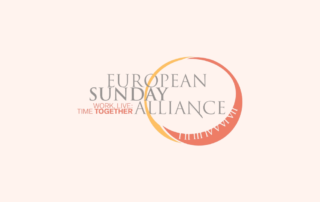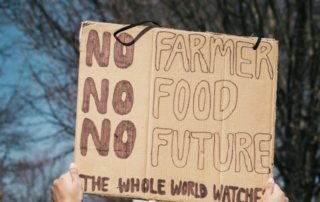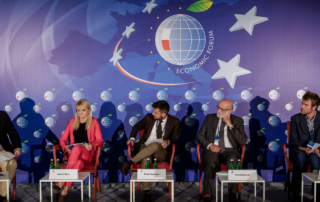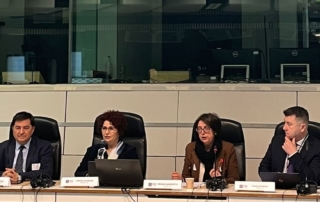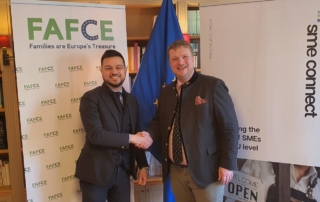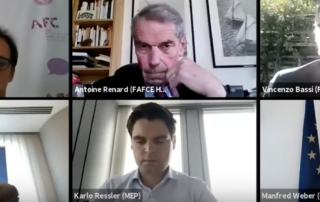Economy of the Family
The areas in which a family operates are relevant not only from a social standpoint but also from an economic one. Like any business, a family operates through organisation, professionalism, and efficiency. Family members conduct their family activities free of charge, producing many positive externalities to their members and to society as a whole. Therefore, a family can be classified as an economic entity, and its function is original and necessary to achieve the common good in areas of constitutional importance (e.g. education and care). Stronger families do not just consume good and services, but also finance the banking system with their savings and help relieve distressed public finances thanks to their intergenerational solidarity.
Family is a relevant economic actor that should be supported as much as companies in its role towards society.
FAFCE backs the work-free Sunday
Brussels, 3rd of March 2024 FAFCE is proud to be a member of the European Sunday Alliance and thanks all its partners for their commitment to this campaign. The European Sunday Alliance has said the following: "On the occasion
OPINION ARTICLE: Recovering Europe’s ‘popular spirit’
Farmer protests must remind us of the families and communities behind production Brussels, the 27th of February 2024 An opinion article by Vincenzo Bassi, President of FAFCE, regarding the ongoing farmers' protests. The current farmers’ protest
Ireland: Marriage should maintain its exclusivity
Brussels, the 12th of February 2024 On the 8th March, Irish citizens will be voting in referendums to amend parts of its constitution. Two amendments will be on the ballot on International Women's Day, with one of them possibly
FAFCE welcomes conclusions on a long-term vision for the EU’s rural areas approved by the European Council
Brussels, the 23rd of November 2023 FAFCE welcomes the conclusions adopted this week by the Council of the European Union on a long-term vision for the EU's rural areas. These conclusions recognise the key contributions of rural areas to
FAFCE at the Economic Forum: Family in the centre of Europe´s future
Brussels, 15th of September 2023 As part of the "Economic Forum" in Karpacz (Poland), the Federation of Catholic Family Associations in Europe (FAFCE) organized a panel entitled "Families in Times of War: Rebuilding Ukraine". This panel considered the major challenges for
IV Convention of the European Network of Family-Friendly Municipalities: “Innovating roots: Working for future generations”
Brussels, 7th of March 2023 FAFCE had the pleasure to participate last week in the IV Convention of the European Network of Family-Friendly Municipalities: “Innovating roots: Working for future generations” organised by the European Large Families Confederation (ELFAC). The
PRESS RELEASE | Cooperation agreement between FAFCE & SME Connect: Together for a more sustainable Europe
PRESS RELEASE Cooperation agreement between FAFCE & SME Connect Together for a more sustainable Europe Brussels, 1st of March 2023 “The digital and the green transitions cannot be dissociated from the demographic transitions, we are therefore convinced of the strategic
FAFCE addresses the motherhood and parental pay gap in a public consultation on pay transparency measures
20 October 2021, FAFCE welcomed the recent Commission’s proposal for a directive on pay transparency measures to tackle the difference of pay between men and women. FAFCE endorsed the Commission’s will to “strengthen the application of the principle of
FAFCE Webinar on “Demographic Change and the Future of Europe”: “Family policies will shape the future of Europe”
4 June 2021 On June 3rd, 2021, FAFCE organised, in cooperation with the European People's Party (EPP) working group on ‘Intercultural and religious dialogue’, a Webinar on the topic of demographic change and the future of Europe. EPP Group
FAFCE Joins the Laudato Si’ Platform to Promote Integral Ecology
A holistic integration of the insights of the Papal Encyclical Laudato Si' into society naturally results in the creation of family policies...Pope Francis’s warning about the dissolution of social bonds constitutes a central current of Laudato Si'. He writes, “the growth of the past two centuries has not always led to an integral development and an improvement in the quality of life. Some of these signs are also symptomatic of real social decline, the silent rupture of the bonds of integration and social cohesion” ( paragraph 46). Family is an indispensable tool of social inclusion and cohesion. Strong families build strong communities, and strong communities protect and empower children to become responsible and impactful citizens that will respect our shared planet as a shared home.

